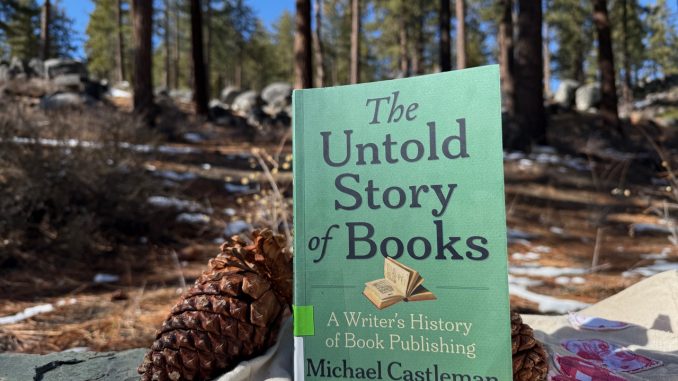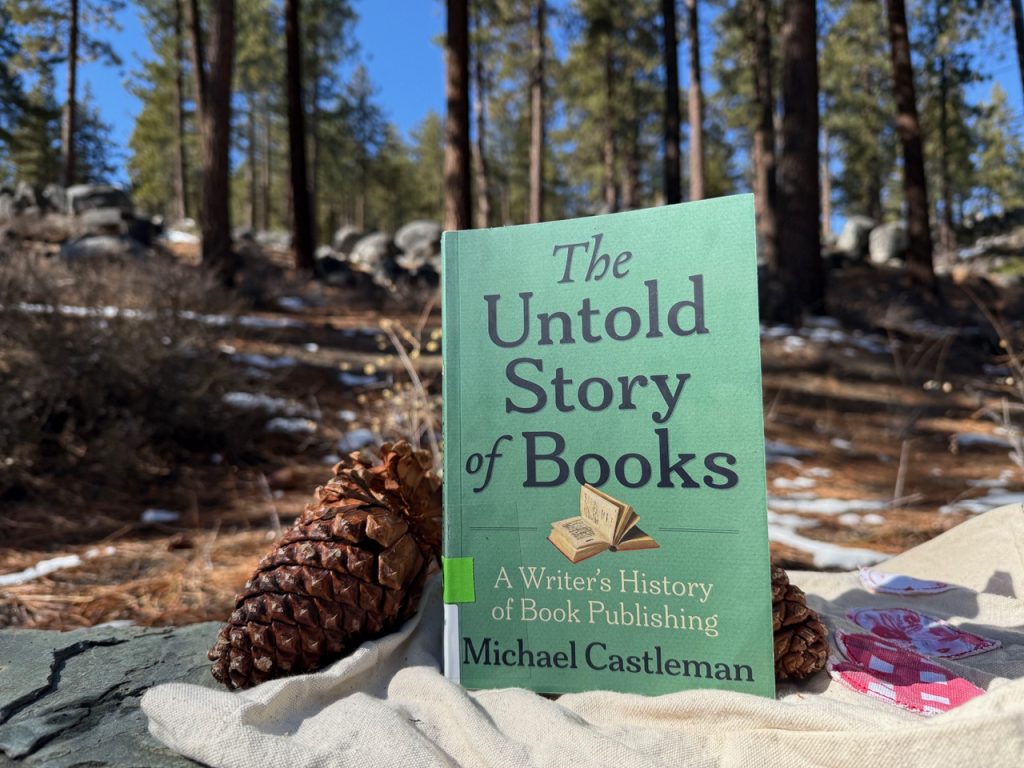
Many books are about stories. But few stories are about books. And this writer’s history is as riveting as a great novel. Nothing like the old boring nonfictions before Netflix.
I couldn’t put it down! After I finished a chapter and went to bed thinking about it, I woke up excited to read more. I wanted to know what will happen next, even though everyone already knows the ending for the story of books — Amazon.
Who would read a book about books? Writers like me who feed on information like there’s no Google. Book nerds like me who just love to read. Anyone who craves a good story. Or the occasional peruser who likes to spout data to look smart. And you’ll really learn a lot from this book. I did.
Michael Castleman has been writing for 50 years. He is an award-winning journalist who has penned 15 nonfiction and four mysteries. Wow. With all that authorship you would think he would have lived up to his name by now.
Yet, Michael still lives in a house, and he tells you how writers like him face the Sisyphian struggle to write books.
“After almost half a century as an author, I’m neither rich nor famous. Chances are you’ve never heard of me,” writes Michael disarmingly.
As a testament to Michael’s tenacity to write, his book has six pages of blurbs from fellow authors and publishing professionals. That’s the longest I’ve seen so far.
I rarely read Introductions because they are usually unnecessary page fillers. But Michael begins with two jokes. And the second joke made me laugh. What a great start! I’ve never read a “serious” nonfiction like that. I was hooked.
Michael uses 44 years of research to compile a 600-year history into 272 pages. Take note Walter Isaacson. He masterfully weaves a mountain of facts into a concise 25-series drama that can hold the attention of TikTok kids.
The 25 chapters are short and snappy, yet captures a snapshot of the past with the vividness of an Instagram Story. There is a point to every scene. And every scene gives an origin story that explains a situation in the present.
You would think books are bland, but Michael depicts a burning saga of crime, wretchedness, slander, treachery, and ruin.
To survive, publishers needed books to print, as Content has always been King. So the Book was coveted, stolen, and pirated through borders. It was a nerd version of the 1920s bootlegging mafia.
The Book is the hero amidst the conflicting interests of the publishers, booksellers, agents, religious and political leaders, and the elite— all part of the Almighty —versus the always Meek Writer.
Regardless of the power struggles between the Almighty and the Meek Writer, the Readers and Masses consume every content they could cheaply buy. Since the 16th century, publishers have been forecasting the death of Books with every technological change: from the printing press, radio, TV, movie, e-books, and now online subscription.
“But repeatedly, new technologies has not killed book reading. Nothing ever has, and all evidence suggests nothing ever will,” writes Michael.
Michael levels up his writing by peppering his scenes with flabbergasting facts that will sound impressive in any party, like the origin of publishing jargon: copyright, uppercase and lowercase, blurbs, pocketbooks, and paperbacks.
Writers will revel in the knowledge that many novelists we consider great today hustled, sold books through speaking engagements, and were self-published: Henry Thoreau, Walt Whitman, Noah Webster, Longfellow. Oh, and Shakespeare was a nobody for years until a pirate published him.
Michael reveals industry information on the mergers of the publishing houses, the best route to self-publication, shocking statistics on actual book sales and authors’ earnings, how effective are book reviews and social media on book sales, and what’s the best predictor of a bestseller. He selflessly shares his publishing journey and humble earnings so writers can manage their expectations.
I was so entertained by this book that I even read his Acknowledgements (peppered with Cattleman editors), bibliography, and Index. Sadly, the Index is useless as the pages are mostly wrong. I love Indexes, so yes, I’m disappointed. I also wish the Index had an entry on Piracy because I wanted to review all those fine moments in publishing crime.
To conclude, Michael tackles the future of Books, the effect of Artificial Intelligence, and the dominance of Amazon. He gives his predictions on how Books will change.
I loved that Michael also raised an equity issue with the New York Times Bestseller list and the whiteness of US publishing. I’ve had the same notions since I became a book reviewer ten years ago because I’m an Asian female immigrant. So I’m glad that Michael, who looks like he belongs to The Club, echoes my marginalized sentiments.
Michael has fulfilled his promise and delivered excellently. He told a riveting story, he grabbed my attention, he entertained me with facts, and he gave me insight into the plight of writers and books.
Ultimately, this book passed the greatest test: I want to reread his book and buy it for others.
@IvyDigest on YT, FB, IG

The Untold Story of Books – A Writer’s History of Book Publishing
By Michael Castleman
Paperback, 272 pages, 2024.
Unnamed Press
GET THE BOOK: https://amzn.to/4b8Zglx
I independently review books that I find fun and informative. Visit your library or buy with my Amazon affiliate link so I can earn chocolate money.
